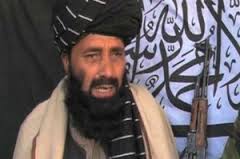
(Credit: geotv)
LAHORE, May 28—A major faction of the Pakistani Taliban broke away and condemned violence on Wednesday, weakening the militant group allied with al Qaeda that seeks to overthrow the Pakistani state.
The split in the Pakistani Taliban, known formally as Tehreek-e-Taliban Pakistan, comes after months of attempted peace negotiations between the government of Prime Minister Nawaz Sharif and the militant organization. It also followed weeks of bloody infighting within the TTP.
The move could push Pakistan closer to an army operation against the remainder of the TTP, an offensive that Washington has long wanted.
Although the stated aim of the talks was to forge a peace deal with the whole TTP, Pakistani officials had privately said the realistic goal was to see which factions were amenable to peace and which were irreconcilable. An operation planned by the army was put on hold when Mr. Sharif launched peace talks in late January.
The breakaway faction is led by a warlord named Sajna who is also known as Khan Said or Khalid Mehsud, announced a “complete separation from the current organization that has lost its way.”
Sajna represents most of the militants from the fierce Mehsud tribe, who made up much of the TTP. His faction, now calling itself Tehreek-e-Taliban Pakistan Mehsud group, accused the rest of the TTP of criminality.
The breakaway group, if it goes on to agree to a peace deal with the government, could now join the ranks of the so-called good Taliban—jihadist groups that don’t fight within Pakistan such as an outfit led by Gul Bahadur, which is active in Afghanistan.
“We consider kidnapping for ransom, extortion, damage to public facilities and bombings to be un-Islamic,” said a statement from the breakaway faction.
“Tehreek-e-Taliban Mehsud group believes in stopping the oppressor from cruelty, and supporting the oppressed.”
The breakaway group was originally led by a commander named Waliur Rehman, who was killed in a U.S. drone strike last year.
It was always considered relatively moderate, It was involved in many of the activities it now condemns and is likely responsible for the deaths of thousands of Pakistanis, analysts said.
The TTP, which works independently of the Afghan Taliban, was formed in 2007 in the lawless tribal areas under the influence of al Qaeda to target Pakistan.
The breakaway group pledged allegiance to the Afghan Taliban.
“We have the deepest respect for jihadist organizations of the right beliefs fighting against evil powers,” the group said.
The rest of the TTP is still led by Mullah Fazlullah, a militant from the Swat district outside the tribal areas who isn’t a Mehsud.
The leadership of the TTP passed outside the Mehsuds for the first time when Mr. Fazlullah was made chief in November after the previous leader, Hakimullah Mehsud, was killed in a U.S. drone stroke.
Many from the Mehsud clan never accepted the new leader.
Rahimullah Yusufzai, a veteran journalist who was formerly part of the government’s negotiating committee for the peace talks, said he expected some other factions of the TTP from the tribal areas to join the breakaway faction.
Parts of the so-called Punjabi Taliban—militants from the country’s most populous Punjab province—could also possibly join.
“Now you will have one less enemy,” Mr. Yusufzai said.
“The Mehsuds have always been the backbone of the TTP. I expect Fazlullah will become weaker, day by day.”
Pakistan’s national-security adviser, Sartaj Aziz, and the Interior Ministry, which is handling the peace talks, both declined to comment on the latest development.
Mr. Fazlullah is believed to be based in eastern Afghanistan, putting him beyond the reach of Pakistan’s armed forces.
A relatively small group of the Mehsud clan militants, led by a commander named Shehryar, remains loyal to Mr. Fazlullah. . Fighting between the Sajna and Shehryar factions has left dozens of militants dead in recent weeks.
Parts of the TTP allegedly have support from Afghan intelligence, a connection made public last year when a TTP commander was snatched from Afghan custody by U.S. forces in Afghanistan.
The breakaway faction said that “using the TTP platform, people in the current organization are tools of secret agencies.”
The Afghan government denies it supports the TTP, and didn’t immediately comment on Sajna’s defection.
Pakistan’s military is thought to be getting impatient for military action against the TTP, one of the sources of its tension with the civilian government.
Following a visit to troops in the tribal areas Tuesday, the army chief, Gen. Raheel Sharif, said: “Together the whole nation has rejected the misplaced ideology of the terrorists, who have clearly lost their cause already and are being marginalized.”
Rifaat Hussain, a security analyst based in Islamabad, said airstrikes by the Pakistani military in recent weeks, along with limited ground action, pointed toward a coming offensive that would target the Fazlullah-led group.
“The army has declared its intention very clearly to launch an operation,” said Mr. Hussain. “The military sees this as an opportunity to finally break the stranglehold of the TTP on the tribal areas.”
The TTP has tentacles across the country and has a major presence in Pakistan’s largest city, Karachi, where they dominate areas around the periphery of the city and, according to police, use it to raise funds through extortion and other criminality.
Saifullah Mahsud, director of the FATA Research Center, an independent think tank in Islamabad, said that Sajna group had emerged as the dominant TTP faction in Karachi, so his departure from the TTP and his pledge against violence could help the law and order situation in Karachi.
“This is a change in strategy for the Sajna people and it helps Pakistan keep its options open,” he said.
— Safdar Dawar and Qasim Nauman contributed to this article.
